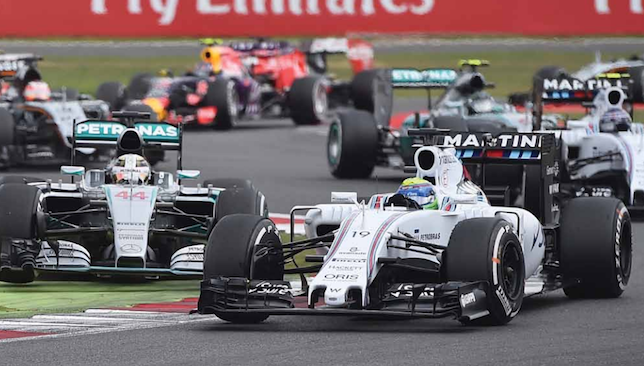
In a week where Formula One fans had pleaded for the sport to become more competitive, yesterday’s British Grand Prix was the perfect riposte.
– British GP: Hamilton wins thrilling Silverstone race
– Massa bemoans rain and Williams mistake
– Rosberg: Hamilton got tyre decision right in victory
There will be those that argue the result still proved inevitable, with Lewis Hamilton leading home a Mercedes one-two for the sixth time this season in nine races.
But it was the journey to get there that captivated: Felipe Massa getting the jump on the two Mercs at the lights, Hamilton proving too aggressive following a restart to drop to third, and then the organised chaos of pitstops that effectively wrapped up the defending world champion’s fifth win of the season.
Sure, there was an air of predictability in those final laps to some degree but as the rain ebbed and flowed and teams played roulette with their tyres with varying degrees of success, no one could properly call the outcome of the race until the chequered flag was waved for Hamilton under dark Silverstone skies.
Amazing to see so many fans on the track after the race.What an incredible fan base we have.Well done and thanks pic.twitter.com/mVNPjo9CJS
— Martin Brundle (@MBrundleF1) July 5, 2015
Hamilton’s victory, though, does not hide the fact that F1 fans have made it be known they are not happy with the state of play. Nine out of 10 fans asked in the Grand Prix Drivers’ Association (GPDA) survey have said they want F1 to be more competitive. But is the sport really that bad?
Millions still tune in each week and there were some 350,000 through the gates over the three-day course of the British Grand Prix weekend. But it’s worth pointing out that Silverstone is an anomaly in a championship where spectator numbers are falling.
At the previous round in Austria, there were just 55,000 who paid for tickets, well down on the 90,000 from 12 months ago. So is better competition the key? Not necessarily.
That has long been the popular gripe: in the days when Michael Schumacher swept to championship upon championship or with the supposed yawns as Sebastian Vettel proved the spearhead in Red Bull’s period of domination before the current reign by Mercedes.
This is not probably the en vogue view but, for me, F1 still remains a breathtaking spectacle of man and machine where, on the evidence of Silverstone, viewers can be on the edge of their seats from light to flag.
But what is the answer to making things better, bar perhaps placing a giant watering can in the sky to switch on the rain as and when to turn the grid completely on its head?
One thing that has thankfully been scrapped is a return to refuelling, with the sport’s lawmakers rightly pointing out that would further reduce on-track overtaking with positions more readily being lost and gained at low speed in the pit lane.
The popular changes are wider cars, wider tyres and more noise, all of which would undoubtedly add to the show, plus there’s plans afoot – with Bernie Ecclestone the key proponent – to change engine rules to allow those trailing well behind Mercedes to play catch-up.
Easing up the technical regulations would allow teams to be more creative and pave the way for some of the less financially lucrative teams to close the gap, rewarding more on innovation than the millions that they to spend.
But the key facet of F1 is the drivers. They are the ones that delight the crowd and it is the drivers’ championship rather than the constructors’ crown that gets people talking.
Mark Webber made the point that fans want to buy into the characters, which is something that is lacking a tad from the slick nature of the sport. But more than anything, the sport’s bosses need to stop griping so readily in public.
It does not help to appeal to the younger audience which F1 is so desperate to lure when Red Bull owner Dietrich Mateschitz is continually threatening to quit the sport, when team principals are at public loggerheads about the best way forward or when the likes of Kimi Raikkonen say that F1 is not risky enough anymore.
Driving a car at 200mph should be a risk and a challenge. No one wants to see tragedy in the sport but there needs to be repercussions for a driver if he thrashes a car to within an inch of its life rather than vast run-off areas and a possible slapped wrist for gaining an unfair advantage.
Sure, F1 needs to improve, the GPDA survey of nearly quarter of a million people from 194 countries makes that clear. But it is not inherently broken. Stop the griping and get on with improving the show.